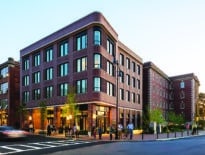Cambridge city councilors approved building heights up to 15 stories for all-affordable housing projects in some of the city’s major commercial districts.
The updates to the zoning code enhance the city’s three-year-old “affordable housing overlay,” which has been credited with helping developers gain timely approvals for projects entirely made up of income-restricted units.
“We have an opportunity to prioritize people over aesthetics,” Councilor Marc McGovern said. “It’s a great opportunity.”
Prior to the 6-3 vote Monday, opponents argued that the changes will create unintended consequences, including driving up the acquisition cost of development sites.
“The result of this is higher land prices and less land for regular housing,” Councilor Dennis Carlone said.
Through the first nine months of 2023, the median sales price in Cambridge was $1.9 million for single-family homes and $900,000 for condominiums, according to data compiled by The Warren Group, publisher of Banker & Tradesman.
Supporters acknowledged that the changes won’t necessarily guarantee a surge of affordable housing development.
“There is no magic wand, no quick fix, no silver bullet that will fix our affordable housing crisis,” Councilor Denise Simmons said.
Overall multifamily construction in Greater Boston has reached a 10-year low, according to a report released Monday by brokerage Colliers, following increasing project costs and rising interest rates on construction loans and permanent debt.
The Cambridge amendments raise the maximum building heights for projects including 100 percent affordable units to 15 stories, or 170 feet, along sections of Massachusetts Avenue and 12 stories, or 140 feet, on other major arteries throughout the city.
Harvard, Porter and Central Squares are located in the highest-density section, while major arteries including Broadway, Alewife Brook Parkway and Memorial Drive are located in the overlay’s corridors section.
Carlone and councilors Patricia Nolan and Paul Toner voted against the changes.
Toner argued that 12-story buildings are incompatible with existing neighborhoods, while Nolan questioned whether zoning is the primary factor limiting affordable housing production.
“The zoning changes, even when passed, will still have to contend with funding issues,” Nolan said.
Most affordable projects rely on multiple public subsidies, including federal low-income tax credits that are awarded by the Massachusetts Executive Office of Housing and Liveable Communities, to complete their financing packages.
The original all-affordable zoning overlay, enacted in 2020, has been credited with helping affordable housing developers gain approvals more quickly and build higher-density projects.
Jesse Kanson-Benanav, executive director of Abundant Housing Massachusetts, said the existing overlay has a proven track record, with more than 500 housing units proposed.
“I still get emails and calls from around the country from legislators and city councilors asking about the Cambridge overlay,” Kanson-Benanav said in an interview Monday. “It really is a model nationally, and I hope that the revision that is adopted becomes a model not only nationally, but locally.”









